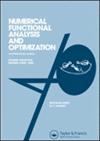How Averaged is the Composition of Two Linear Projections?
IF 1.4
4区 数学
Q2 MATHEMATICS, APPLIED
Numerical Functional Analysis and Optimization
Pub Date : 2023-10-29
DOI:10.1080/01630563.2023.2270308
引用次数: 0
Abstract
AbstractProjection operators are fundamental algorithmic operators in Analysis and Optimization. It is well known that these operators are firmly nonexpansive; however, their composition is generally only averaged and no longer firmly nonexpansive. In this note, we introduce the modulus of averagedness and provide an exact result for the composition of two linear projection operators. As a consequence, we deduce that the Ogura–Yamada bound for the modulus of the composition is sharp.KEYWORDS: Averaged mappingFriedrichs anglemodulus of averagednessnonexpansive mappingOgura–Yamada boundprojectionMATHEMATICS SUBJECT CLASSIFICATION: Primary: 47H09Secondary: 65K0590C25 AcknowledgmentsThe authors thank the reviewers and the editors for careful reading and constructive comments. We also thank Dr. Andrzej Cegielski for making us aware of his recent work [Citation3] which contains complementary results.Notes1 Usually, one excludes the cases κ = 0 and κ = 1 in the study of averaged operators, but it is very convenient in this paper to allow for this case.2 We assume for convenience throughout the paper that the operators have full domain which is the case in all algorithmic applications we are aware of. One could obviously generalize this notion to allow for operators whose domains are proper subsets of X.Additional informationFundingThe research of the authors was partially supported by Discovery Grants of the Natural Sciences and Engineering Research Council of Canada.两个线性投影的合成有多平均?
摘要投影算子是分析与优化中的基本算法算子。众所周知,这些算符是绝对非膨胀的;然而,它们的组成通常只是平均的,而不再是稳定的非膨胀性的。在本文中,我们引入了平均模,并给出了两个线性投影算子复合的一个精确结果。因此,我们推导出复合模的Ogura-Yamada界是尖锐的。关键词:平均映射friedrichs角平均模非膨胀映射gogura - yamada边界投影数学学科分类:初级:47h09次级:65K0590C25致谢作者感谢审稿人和编辑的认真阅读和建设性的意见。我们还要感谢Andrzej Cegielski博士使我们了解到他最近的工作,其中包含了互补的结果。注1在研究平均算子时,通常会排除κ = 0和κ = 1的情况,但在本文中考虑到这种情况是非常方便的为了方便起见,我们在本文中假设算子具有完整的域,这在我们所知道的所有算法应用中都是如此。显然,我们可以将这一概念推广到允许算子的域是x的适当子集。附加信息资金本文作者的研究部分得到了加拿大自然科学与工程研究委员会的发现补助金的支持。
本文章由计算机程序翻译,如有差异,请以英文原文为准。
求助全文
约1分钟内获得全文
求助全文
来源期刊
CiteScore
2.40
自引率
8.30%
发文量
74
审稿时长
6-12 weeks
期刊介绍:
Numerical Functional Analysis and Optimization is a journal aimed at development and applications of functional analysis and operator-theoretic methods in numerical analysis, optimization and approximation theory, control theory, signal and image processing, inverse and ill-posed problems, applied and computational harmonic analysis, operator equations, and nonlinear functional analysis. Not all high-quality papers within the union of these fields are within the scope of NFAO. Generalizations and abstractions that significantly advance their fields and reinforce the concrete by providing new insight and important results for problems arising from applications are welcome. On the other hand, technical generalizations for their own sake with window dressing about applications, or variants of known results and algorithms, are not suitable for this journal.
Numerical Functional Analysis and Optimization publishes about 70 papers per year. It is our current policy to limit consideration to one submitted paper by any author/co-author per two consecutive years. Exception will be made for seminal papers.

 求助内容:
求助内容: 应助结果提醒方式:
应助结果提醒方式:


